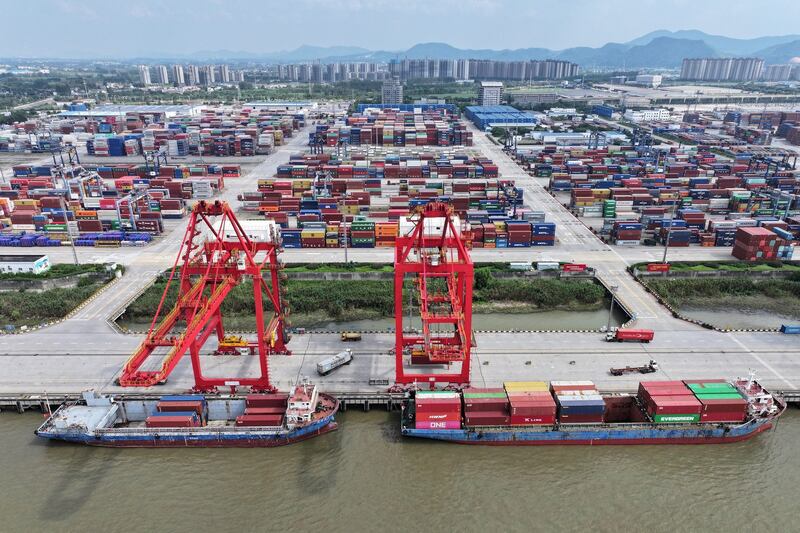Cash-strapped local authorities across China are struggling to pay public employees, people connected to officialdom say, as a burst property bubble and dwindling exports depict an increasingly grim outlook for the world’s second-largest economy,
In recent interviews with Radio Free Asia, people with connections to the government from Shandong and Wuhan to Nanjing told similar stories of unpaid wages, pensions and government funding.
The accounts add to the multiplying economic problems in China even as President Xi Jinping pins his hopes of an economic recovery on boosting domestic demand and investment rather than relying on exports.
Weak consumer demand has tipped the world's second largest economy into deflation – with growing pressure on Beijing to deliver a bigger economic stimulus package in the form of public spending.
Trade figures released on Thursday pointed to weakening exports – a key driver of China's economic growth for decades – which fell by 8.8% in August month-on-month to US$284.87 billion, the fourth consecutive monthly decrease this year. Imports fell by 7.3% month-on-month to US$216.51 billion.
And unpaid government wages are likely to compound the lack of consumer demand.
A retired civil servant from the eastern province of Shandong who gave only the surname Zhou for fear of reprisals said his former colleagues in the Binzhou district government haven't been paid in more than a month.
"Civil servants in the Binzhou government system who are still working haven't been paid, starting last month," Zhou said. "This used to happen in a district once in a while, but now most districts haven't paid out wages in more than a month, and neither have public institutions."
"The government has no tools left in its toolbox," he said, adding that civil servants are less likely to protest as they have other, "gray" income streams to rely on.
Ever-mounting debt burden
Local governments have seen their coffers drained by three years of society-wide COVID-19 restrictions, as well as a sharp fall in land transfer fees – which once made up 40% of local fiscal revenues – and other property-related income.
They are now struggling with an ever-mounting debt burden, prompting officials to borrow more to pay back old debts, and to raid the coffers of medical insurance funds to make ends meet, resulting in cuts to medical benefits and mass protests in major cities in February.

A resident of the northern port city of Tianjin told Radio Free Asia that at least four district governments in that city, including Hebei district government, are in financial dire straits, with civil servants across many departments owed several months' wages.
And a resident of Shandong's Jiaozhou city who gave only the surname Zhang, citing security concerns, said many civil servants and public employees in the city have been unpaid for several months.
"The salaries of civil servants in Qingdao, Weifang city, Gaomi city, and in several of our local townships have gone unpaid since Spring Festival [Lunar New Year in February]," Zhang said. "Either that, or they've only had part of [what's owed]."
"There are many instances now of civil servants unable to receive their salaries, and government finances in deficit," he said.
‘We need to survive’
Civil servants in the eastern city of Nanjing have also gone unpaid this month, with the municipal government pooling resources with the Jiangning district government to help out financially stricken Gaochun district, while many local construction projects have ground to a halt for lack of funding and factories are "almost silent," a resident told Radio Free Asia.
A group of more than 30 protesters held up a banner outside the Guilin Municipal Radio, Film and Television Bureau in Guangxi in a video clip posted to social media, saying they hadn't gotten paid in six months.
"No wages in six months," the banner read. "We need to survive."

The Guilin branch of China's internet regulator, the Cyberspace Administration, issued a statement on WeChat on Thursday denying the state broadcaster was in financial trouble.
Calls to the Guilin Municipal Radio and Television Bureau went unconnected during office hours on Thursday.
Guizhou issued a rare public appeal to the central government for assistance in April, despite warnings from Beijing in January that there would be no bailouts, sparking fears that it could be the first Chinese province ever to go bankrupt.
Last month, authorities in Guangzhou eased the rules on mortgage lending in a bid to shore up the local market and the flagging economy, in a move Beijing hopes will boost consumer demand.
The move came amid ongoing worries about contagion from debt repayment troubles at major Chinese property developers, and slower-than-expected retail sales, industrial output and investment.
Translated by Luisetta Mudie. Edited by Malcolm Foster.
